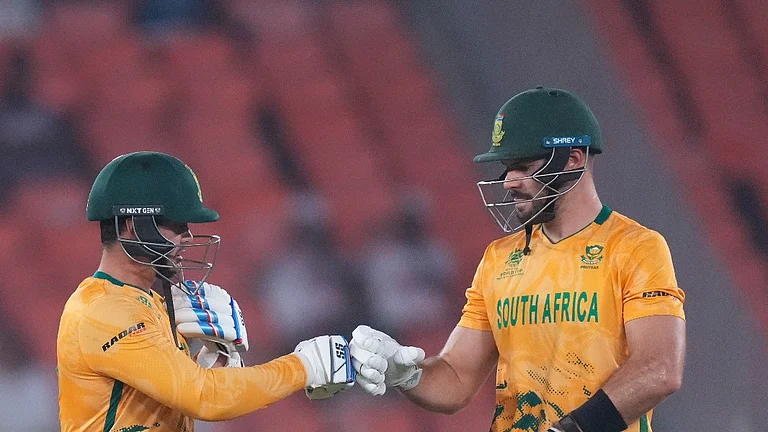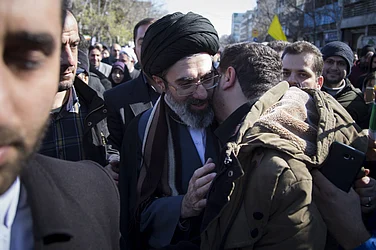Israel has said that South Africa painted a “distorted” picture of the facts in its case before the International Court of Justice (ICJ) where it accused Israel of committing genocide against Palestinians. The two-day hearing at The Haque-based UN court concluded on Friday as Israel put forward its team of lawyers and legal advisors to defend itself against the claims of violation of the 1948 Genocide Convention.
This comes a day after South Africa presented its arguments in the landmark case, articulating the plight of Palestinians in Gaza who have been bombarded by relentless Israeli airstrikes and a deadly military ground offensive, especially since October 7. South African lawyers asked the court to order an immediate halt to Israeli military operations in the besieged territory that is home to 2.3 million Palestinians, most of whom stand displaced.
Israel, which was founded in the aftermath of the Holocaust, vehemently denied the accusations brought by South Africa.
Flow of Proceedings
The second day of hearing in the genocide case at ICJ started with the opening statement of the legal adviser of the Israeli Ministry of Foreign Affairs, Tal Becker. The first person to present Israel’s case at the world court was Tal Becker. He was followed by Malcolm Shaw, professor of international law at the University of Leicester in the UK, Galit Raguan, acting director of the international justice division at Israel’s Justice Ministry; Omri Sender, a lawyer at S Horowitz & Co in Tel Aviv; and Christopher Staker, an international lawyer. The final words were presented by Gilad Noam, Israel’s deputy attorney general, following which the sitting was closed.
Israel Cries ‘Self-Defence’
In his opening arguments, Becker said that South Africa’s calls for provisional measures for Israel to end its military operations in Gaza “cannot stand” as the country was acting in self-defence against the Hamas attacks of October 7.
“It is impossible to understand the armed conflict in Gaza without appreciating the nature of the threat that Israel is facing and the brutality and lawlessness of the armed force confronting it,” Becker told the court, as he proceeded to show footage of the Hamas attack. The death toll from the October 7 attack in Israel stands at 1,139.
Becker added that South Africa has put forward a “sweeping counter-factual description" and a “distorted factual and legal picture” of the Israel-Palestinian conflict.
South African Justice Minister Ronald Lamola had told ICJ yesterday that “no armed attack on a state territory, no matter how serious, even an attack involving atrocity crimes, can provide any justification for, or defence to, breaches” of the Genocide Convention. Israel’s attacks in Gaza, since Hamas’ airstrikes, have killed more than 23,000 people and injured over 50,000.
‘South Africa Has Close Ties With Hamas’
Becker remarked that instead of Israel the court should apply provisional measures against South Africa, accusing it of enjoying close ties with Hamas, which is recognised as a terrorist organisation by many countries. This, he said, undermines the credibility of South Africa’s claims.
Zane Dangor, director general of South Africa’s Ministry of International Relations, strongly objected to the allegation. “South Africa’s legal team represents the people of South Africa,” Dangor said after the ICJ hearing, adding that the case is “in the interest of justice” for Palestinians.
Becker also said that Hamas committed a “wholesale massacre” and was responsible for starting the war. “Israel is in a war of defence against Hamas, not against the Palestinian people.”
He argued that Hamas had embedded its military operations in civilian areas of Gaza, which resulted in a devastating toll on Palestinians. “What Israel is doing in Gaza is not to destroy people but protect its people,” Becker said.
‘No Evidence Of Genocide’
Malcolm Shaw, who took up the stand next, launched a point-by-point attack against South Africa and said that there was no evidence of the genocidal intent that South Africa has claimed. If the genocide charge is levelled incorrectly, he said, “the essence of this crime would be lost”.
Shaw questioned South Africa’s claims of trying to open a dialogue with Israel, referring to South Africa’s representative and international law Professor John Duggard's argument, and said that it was Israel that sought bilateral talks while South Africa chose to proceed with the ICJ case.
He went on to reiterate that the genocide case did not stand ground and that if Israeli forces had broken any other rules of conflict, the matter could be handled by “Israel’s robust and independent legal system”.
‘Urban Warfare’ Always Results In ‘Civilian Harm’
Galit Raguan from Israel’s Justice Ministry said that “urban warfare will always result in civilian harm” but they do not constitute genocidal acts. They are, she said, “unintended but lawful result of attacks on military targets.”
Raguan denied that Israel launched airstrikes on hospitals in Gaza and claimed that the damage to civilians was a “result of hostilities” in the “vicinity” of hospitals. She insisted that Hamas has been using hospitals for military purposes.
Staker argued that any provisional measures imposed on Israel would undermine its ability to contend with the security threat against it, give Hamas an advantage to build its capabilities and cut short Israel’s attempts to rescue the hostages in Gaza. Gilad Noam, to made the closing statement, seconded this and said that the measures sought by South Africa are “unwarranted and prejudicial”.
Israel’s Arguments v. Situation in Gaza
Israel has continuously bombed Gaza, displacing Palestinians first from the north and then from the south. The death toll, according to Gaza’s health ministry, stands at 23,469, including nearly 10,000 children.
Israel has bombed several hospitals and refugee camps claiming them to be Hamas command posts. Israel has not shown any evidence of this to date. On October 18, an Israeli airstrike hit the Al-Ahli Baptist Hospital, lying in the centre of the besieged Gaza Strip. On November 15, Israeli forces raided Al-Shifa, Gaza's biggest hospital, where thousands of Palestinians were sheltering, following a series of airstrikes around its compound. On November 18, Israel bombed a UN refugee camp in north Gaza's Jabalia, one of the biggest refugee centres in the region. These are only a few among the thousands of airstrikes on homes and schools.
The Israeli blockade has also cut water and power supply and deliveries of food, fuel, medicines and other necessities to the territory, leaving civilians without basic survival needs.
What Happens Next?
Before closing the two-day proceedings, ICJ President Joan Donoghue said that the court will give its ruling on provisional measures sought by South Africa in the coming days. The court will then enter a lengthy process of considering the full case.
It is also important to note that even if ICJ gives a ruling in favour of South Africa's filing for provisional measures, they may not always be followed. In 2022, in a genocide case filed by Ukraine against Russia, the court ordered Moscow to immediately suspend its invasion, but the order was ignored.
The ICJ, although the highest judicial body of the United Nations, does not have a police force to implement its rulings. If a nation believes another member has failed to comply with an ICJ order, it can report that to the Security Council, UN’s most powerful body which has tools ranging from from sanctions to authorising military action.
The world court, which rules on disputes between nations, has never judged a country to be responsible for genocide. The closest it came was in 2007 when it ruled that Serbia “violated the obligation to prevent genocide" in the July 1995 massacre by Bosnian Serb forces of more than 8,000 Muslim men and boys in the Bosnian enclave of Srebrenica.






















